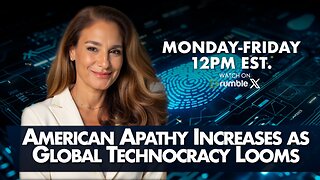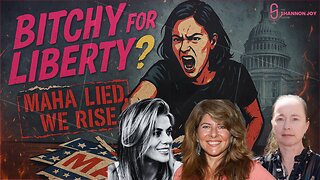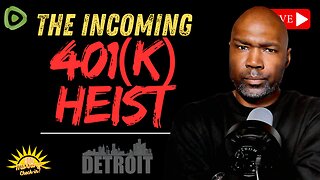Premium Only Content

Howard Phillips in Second American Revolution documentary (1999)
Howard Phillips appearance the "Second American Revolution" segment of God's Law & Society (1999), a 10-part documentary series hosted by Eric Holmberg.
00:00 PART 4: The Christian Foundations of Civil Government
"Question:-- How did Christian philosophy influence our form of civil government?
Howard Phillips: Throughout history, there have been three political parties. One is the party that believes in the sovereignty of God, and today I work with such a party, the U.S. Taxpayers Party. The other is a party that believes in the sovereignty of man and man's reason; Libertarians are of that view. The third is every other party that believes in the sovereignty of the state, that the state if God walking on earth. That philosophy came into full flower in the 1960s during the presidency of Lyndon Johnson. During that presidency, every perverse cause from which America now suffers, received federal funding. We saw the federal government become the provisioner of the forces of cultural disintegration and social chaos in our country.
The federal government has no role as an instrument of salvation. Salvation is by the blood of Christ and faith in Him by God's grace. But government should stop being an instrument of moral degradation. I had the opportunity to be a "fly on the wall" during a period of extraordinary change in America. During the Johnson administration when they were launching the Great Society, I was chairman of the Republican Party in Boston. I spent a lot of time in the black community in Boston. I saw how federal funds were being used to destabilize the black family, to promote the notion of welfare rights, to promote abortion, homosexuality, the idea of quotas, forced busing. I saw how the black churches were destabilized with federal funds. I saw federal funds going to radicals of very left wing beliefs.
As director of the U.S. Office of Economic Opportunity, I came to see exactly how that was being done. I worked very hard to persuade President Nixon to veto the continuation of that funding. Tragically, President Nixon, like all of his successors, not only signed into law additional appropriations, he in fact created new entities that did more harm. So did his successors. As we see the federal government's budget grow year after year, more and more of this money is being used to fund people who are evangelists for ideas which are antithetical to the founding Christian premises of the United States of America.
Congress has the right and duty to set policy in areas which are assigned to Congress in the Constitution (especially in Art.1, Sect. 8). But the federal government does not have any power to act beyond its delegated enumerated powers. What I particularly object to is Congress giving money to private organizations which use tax dollars for cultural, ideological, economic political advocacy, whether it's for the National Endowment for the Arts, the Legal Services Corporation; whether it's to groups such as Gay Men's Health Crisis, in the name of AIDS education; whether it's to "Murder Incorporated," otherwise known as Planned Parenthood, which uses tax dollars to the tune of billions over the years to advance its agenda of promiscuity and liberal abortion. That is not only morally wrong but it is completely unconstitutional."
03:50 PART 5: The Declaration of Independence and the U.S. Constitution
"Question:-- Were the Declaration of Independence and the Constitution drafted to uphold the moral laws of God -- or were they Deistic humanist documents? If they were Christian documents, where have we gone so far off track?
Howard Phillips: The Declaration of Independence is, in effect, the articles of incorporation or the preamble for our federal union and the Constitution of the United States is the bylaws. The Declaration says that "we are endowed by our Creator with certain inalienable rights." It acknowledges that our rights are a gift from God, that we are His creatures. It is a simple statement of fact that if God is "Sovereign," as the framers acknowledged Him to be, that law is inevitably the will of the Sovereign. The laws of God cannot be overturned by a two-thirds vote of Congress or even a unanimous decision of the Supreme Court. Abortion is always illegal in the sight of God. If a civil government chooses to permit it, that doesn't make it legal in His sight. It simply criminalizes the civil government which advances it.
The Declaration goes on to make the point that government derives its just powers from the consent of the governed. There is a theological principle there in that the governed are God's creatures who owe a duty to their Creator to the degree that they delegate policy setting functions and control of resources to civil government. They have an obligation to God to hold civil government accountable to them so that they may be accountable to Him. The link between the Declaration and the Constitution can be seen in the very first sentence of the Constitution after the preamble which says that "all legislative powers shall be vested in a Congress of the United States." "All" ... "vested," mean they "can't be surrendered."
One of the problems is that Congress simply is not doing its constitutional duty. Look at the question of impeachment. That's not an independent counsel's responsibility. Under the U.S. Constitution, impeachment is the responsibility of the U.S. House of Representatives. If the House determines to bring charges against the president, then it's the responsibility of the Senate to determine whether he should be convicted and removed from office. The Republican congress pushed for giving the President line item veto authority. It was unconstitutional for them to do so. I am glad the Supreme Court recognized that. The Constitution permits the President, indeed mandate that he shall be, our chief executive. But it does not authorize him to be our chief legislator. Congress cannot delegate legislative functions to the President. Congress has given policy setting functions to regulatory agencies. That violates the letter of the first sentence of the body of the Constitutional law."
07:30 PART 6: Separation of Church and State
Question:-- What about the "establishment of religion" clause in the U.S. Constitution? Doesn't the U.S. Constitution forbid the display of religion in the civil sphere?
Howard Phillips: The Constitution of the United States guarantees liberty of conscience when it says: "Congress shall make no law respecting the establishment of religion, nor prohibiting the free exercise thereof" in the First Amendment to the Constitution which begins the Bill of Rights. The core principle underlying the First Amendment was found in the writings of Thomas Jefferson and in the Virginia Declaration of Religious Liberty. Jefferson asserted correctly that to compel a man to subsidize with his taxes the propagation of ideas he disbelieves and abhors is sinful and tyrannical. The states which came together to form our federal union each had religious establishments at the time of the Constitution's ratification: a Catholic establishment in Maryland; an Anglican establishment in Virginia; a Congregational establishment in Massachusetts. In all cases, it was understood that the British Common Law was the core of the legal system in all of the states which came together to found the Union. British Common Law had its roots in Holy Scripture which began to take root under King Alfred in Britain.
Everyone has a right to his opinion, but America got underway with a Christian legal system. States were permitted to apply the death penalty for premeditated murder. The individual could worship as he saw fit and the federal government would not interfere with him, nor would it require him to support with his taxes anyone else's form of worship.
What we neglect to appreciate is that religion is not just Christianity, Buddhism, Judaism. Religion is any organized body of ideas about the nature of God and man. Humanism is a religion. Advocacy of homosexual conduct is in many ways a religion. Earth worship, radical environmentalism, one-worldism, all of these are forms of religious faith. They are belief systems which are coherent and comprehensive. People have a right to those opinions, but they don't have a right to require us to subsidize them with our taxes. That is why it is unconstitutional for Congress to turn over our tax dollars or control over our policy to other law systems, such as those at the United Nations, the International Monetary Fund, NAFTA, the World Trade Organization. Under the principle of accountability, which is core to any system of representative republicanism, it's essential that Congress not turn over policy setting functions to private non-profit corporations, to bureaucrats, to any kind of entity which does not have to stand for election in a manner in which the voters can say: "yea or nay."
10:55 PART 9: Freedom and the Christian Republic
"Question:-- In a Christian republic based on biblical law, would non-Christian religions be banned or would they have as much freedom as they have now?
Howard Phillips: Some people think that Christians who have a Constitutional view are moral imperialists. Quite the contrary. We are seeking to defend ourselves against the immoral imperialism of those who are using the power of civil government to advance their religious agenda, which involves environmental extremism, abortion, homosexuality, the destruction of the traditional family. We want the federal government to be limited to its delegated enumerated powers. We do not want to subsidize our perspective by giving money to organizations or individuals who are using the courts, or who are lobbyists, or who are editorial writers, or securing government grants to advance our agenda. We simply want to stop others from requiring us to send our tax money to Washington to advance their agenda.
If you do it our way, instead of supporting a Leviathan government which costs you two trillion dollars a year, you'll be able to keep your own money. You won't have to pay a penny in income tax, sales tax, inheritance tax, capital gains tax, business tax. Social security will be privatized. The federal government will get out of the land business. Federal expenditures will be less than 500 billion dollars a year and the government will support itself the way it did for most of our history, through excises, imposts, duties and apportionment among the states. We think that if people see that they can be free again, that they don't have to have one spouse working to support the government while the other spouse works to support the family, that they will rally behind this kind of approach. This is not moral imperialism; this is liberty.
I would encourage those who believe in ghettoizing their faith to listen carefully as they recite the Lord's prayer which talks about building His kingdom on earth as it is in heaven. Our job is to occupy until He comes. There is nothing in Scripture that can be cited as an excuse for not doing our duty to seek His justice and His glory."
ATTRIBUTION:
* Jcr4runner. "Second American Revolution: Howard Phillips (1 of 4)". YouTube.com, 16 Jan. 2007. <https://youtube.com/watch?v=VdhNVpGZzvY>
* Jcr4runner. "Second American Revolution: Howard Phillips (2 of 4)". YouTube.com, 16 Jan. 2007. <https://youtube.com/watch?v=5bD218X3khc>
* Jcr4runner. "Second American Revolution: Howard Phillips (3 of 4)". YouTube.com, 16 Jan. 2007. <https://youtube.com/watch?v=NiuJ7pZvw8Q>
* Jcr4runner. "Second American Revolution: Howard Phillips (4 of 4)". YouTube.com, 16 Jan. 2007. <https://www.youtube.com/watch?v=QiuP6W4COu0>
-
 1:00:44
1:00:44
VINCE
3 hours agoThe Obamagate Story Just Got Even Weirder | Episode 98 - 08/07/25
178K238 -
 LIVE
LIVE
Major League Fishing
1 day agoLIVE! - Bass Pro Tour: Stage 7 - Day 1
483 watching -
 LIVE
LIVE
Flyover Conservatives
11 hours agoThe Unseen War: How To Win The Raging War You Can't See with Victor Marx | FOC Show
186 watching -
 LIVE
LIVE
LumpyPotatoX2
4 hours agoBattlefield 6: OPEN BETA - #RumbleGaming
127 watching -
 LIVE
LIVE
The Mel K Show
1 hour agoMORNINGS WITH MEL K - American Apathy Increases as Global Technocracy Looms 8-7-25
727 watching -
 LIVE
LIVE
The Shannon Joy Show
1 hour ago🔥🔥Is It Time To Get Bitchy For Liberty?? MAHA Betrayals Spark Outrage! Live Exclusive With Naomi Wolf & Sasha Latypova 🔥🔥
204 watching -
 LIVE
LIVE
Trumpet Daily
59 minutes agoTrumpet Daily LIVE | Aug. 7, 2025
468 watching -

Tudor Dixon
1 hour agoFaith, Freedom, and the Future of Universities with Robert P. George | The Tudor Dixon Podcast
3.4K1 -
 32:16
32:16
Rethinking the Dollar
59 minutes agoPrivate Equity Is Dying—Trump Wants Your 401(k) to Save It | Morning Check-In: Let's Talk...
4.99K -
 LIVE
LIVE
GloryJean
1 hour agoBattlefield 6 Beta is HERE!!! Let's See The Hype 🔥
52 watching